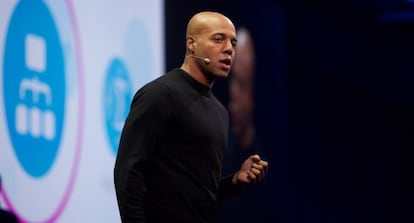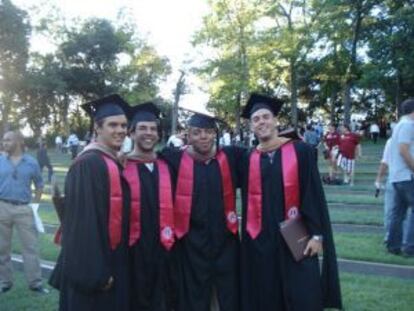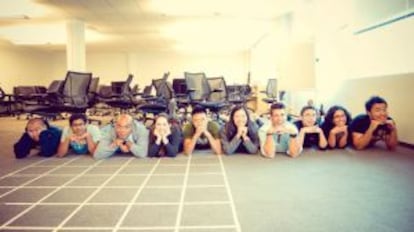¡°Anybody who is reasonably smart can make it in Silicon Valley¡±
Adeyemi Ajao, cofounder of Tuenti, discusses life among the California tech set


Adeyemi Ajao doesn¡¯t have to answer to anybody. The 33-year-old has cofounded companies such as social networking site Tuenti (sold to Telef¨®nica for €70 million) and big-data-based recruitment company Identified (bought by US firm Workday in 2014) and has the resources to invest in around 30 projects in Silicon Valley. When he discusses startups in San Francisco ¨C the city in which he has lived for the last seven years ¨C he does so with disarming frankness, rejecting what he calls the modus operandi of the cradle of the tech industry.
The son of a Nigerian father and Spanish mother, Ajao is one of Spain¡¯s most successful tech entrepreneurs. Proof of that is his presence on the panel ¡°Building Billion Dollar Businesses Outside the Valley,¡± which was organized last month in Madrid by South Summit, southern Europe¡¯s key startup event.
As soon as you are associated with a winning idea, you can start to talk, but not before. In that sense, Silicon Valley has a very meritocratic system¡±
Question. Aside from cofounding Tuenti and launching Identified, you have invested in startups such as Jobandtalent, Pixable and Cabify. When did your love affair with technology begin?
Answer. I got my first computer at the age of 12: it had no hard drive and worked with a cassette. This was in the pre-internet age, so I had to program games myself. That same year we began to learn code at school: I went to Albor¨¢n in Marbella. We were taught RM/COBOL, a basic programming language. F¨¦lix Ruiz, president of Jobandtalent, was in my class. We later set up a hacking team. We used to hack into the computers of other people in our class and get up to mischief. That¡¯s where the seed was planted for what came later.
Q. But you first studied law. Why?
A. I was fascinated by maths and physics and was a chess freak, so much so that my mom banned me from playing it; she told me to go out to play with my friends, to socialize, and that one day I would thank her. From a young age, I was always thinking about inventing something technological and then setting up a company to monetize it. When it came time to go to university I knew I wanted to go to the United States, and had already been pre-enrolled at MIT, but for family reasons I stayed in Spain. My aunt, who is a scientist, had always been critical of the Spanish university system, saying it was all about memorizing stuff. In the end I went to ICADE because everybody said it produced the best entrepreneurs. That¡¯s where I met Juan Urdiales [co-founder of Jobandtalent] as well as Joaqu¨ªn Ayuso, with whom I set up Tuenti in 2006.

Q. Was it your idea?
A. In my fourth year of studies I went to Atlanta on an exchange program. Each person I met wanted me to friend them on Facebook. I had been looking for a business idea and that¡¯s where I saw it. I called F¨¦lix and told him I knew what we had to do. When I got back, we set up Tuenti. F¨¦lix was in charge of marketing, Joaqu¨ªn took care of programming, and I handled structure. It was my last year of studies, and I got terrible results, and a lot of teachers thought I was going astray. But the project worked, we found three investors and ended up with more traffic in Spain than Twitter and Facebook put together.
Q. How did you make the leap to Silicon Valley?
A. I always knew I would do anything to get there. In 2008 I was awarded a grant by the Ram¨®n Areces foundation to do an MBA at Stanford University [in Palo Alto]. I took the year off to relax. I needed it. I focused on studying and kept the business at arm¡¯s length. The second year, I set up Identified. My biggest fear before I got there was that I wouldn¡¯t be smart enough. The image from outside is that the place is full of geniuses, but I have since realized that¡¯s nonsense. The important thing is to persevere and learn to ignore the noise. Anybody who is reasonably smart can make it there. It¡¯s hard to understand the business culture, to know how to talk to investors, how engineers work, and to be happy while doing all that and maintaining some kind of personal life.
Q. What most surprised you about the start-up system there? And how did you manage to find your place among the tech giants seeking global domination?
Creating a culture where people feel they have to live in the office is a mistake¡±
A. Once you¡¯re there, they make you feel like an outsider. Silicon Valley is an oligopoly where five percent of venture capital funds make 90 percent of the profit, and that¡¯s not just because they employ the right people. They have powerful brands and a strong market position. For example, if Sequoia Capital invests in you then you are seen as a big company and that attracts more clients and new professionals who want to work with you. It¡¯s very hard to break into that circle. There are enormous barriers to get over and that is the impression they want to give, that¡¯s why everybody wants to be there. Although I created Tuenti, they just dismiss it as something Spanish and ask how you are going to run your team from here. It takes a long time before they take you seriously.
Q. How can you break through the barriers?
A. A lot of people try networking, but I wouldn¡¯t recommend it. The secret is to make a success of something there: the best thing to do is simply focus on your project. As soon as you are associated with a winning idea, then you can start to talk, but not before. In this sense, it¡¯s a very meritocratic system. It¡¯s true that 55 percent of businesses there have a foreign co-founder, but they always make you feel like an outsider. When they open the door to you, they start inviting you to the best parties and introduce you to the best funds¡ The main handicap you¡¯ll face is that you¡¯re in a very small community, say, 800,000 people who are all interconnected. You have to be alert 24 hours a day and watch what you say. You have to accept that each conversation you have will be commented on in the circles that matter to you. If you talk to a Facebook engineer and then later on you want to hire people from there, this guy is going to tell everybody whether your company is doing well or if you asked him a technical question he thinks is dumb. If you talk to an investor, when you go out to raise money everybody will know, for example, that five months ago your clients were not buying as much as you would have liked. Everybody asks how you¡¯re doing and the problem is you can¡¯t really be honest, and so sometimes you feel very alone.

[Ajao pauses at this point, explaining the stress this all caused him at the beginning. All the entrepreneurs in his circle insist that their products are viral, that they have hired the best engineers in the Valley, and that they feel great, despite not having spoken to their family or friends for weeks, because the company is now their family. That¡¯s what the investors want to hear. It¡¯s a requirement, and if you don¡¯t play the game, people will think things aren¡¯t going well.]
If you say you¡¯ve got three good engineers and that the others are okay, you¡¯re sunk. Then they¡¯ll start asking you about your metrics and they¡¯ll then check what you¡¯ve said with other people.
Q. Doesn¡¯t it get tiring after a while to be always selling yourself?
A. Yes, it¡¯s a pretty negative dynamic. You have to be transparent with your employees, but at the same time, you can¡¯t tell them your problems, because that generates suspicion. The idea is that you¡¯re on top to deal with problems and not to burden others with them. It¡¯s the same with your investors: you have to be honest, but you can¡¯t expect to cry on their shoulders: they¡¯ve given you money so that you can manage it. But who¡¯s going to help you? That¡¯s the big dilemma.
Q. Have you always fought against the culture of not sleeping?
A. On a human level, you, me, and the founder of Facebook all need to sleep. If we don¡¯t rest properly, we don¡¯t think properly, we get into a bad mood and we treat our employees badly. I don¡¯t buy into the whole ¡°I sleep three hours a night but it doesn¡¯t matter because I love my work.¡± That¡¯s a lie. I am always sending people home. I give them four days¡¯ holiday if I see they are blocked and that their code is horrible. Creating a culture where people feel they have to live in the office is a mistake.
Q. What¡¯s the most important thing you¡¯ve learned in your seven years in California?
A. I have learned to manage my time, which wasn¡¯t something that came to me naturally. There are only so many decisions I can take in a day. I¡¯m not superman. Knowing how to focus your attention is the most difficult aspect of running a startup. One of my investors gave me some good advice many years ago, which I ignored. He told me to spend Sundays thinking about what was the most important thing I had to do that week and then on Monday start with a team meeting at which everybody had to come up with their contribution to reaching those goals. It¡¯s a very healthy thing to do amid the chaos.
Q. Investors pump tens of millions of dollars into startups that are still not able to generate income from their services or products. Do you think we are heading toward another dot.com bust?
A. During the industrial revolution, people asked whether the human body could withstand the speed that trains traveled at. Anybody who thinks the tech sector is going to shrink over the next decade is very much mistaken. Such a thing could only happen if there were some kind of apocalypse, whereby the only things that would matter would be having a stash of canned food and a rifle.
Tu suscripci¨®n se est¨¢ usando en otro dispositivo
?Quieres a?adir otro usuario a tu suscripci¨®n?
Si contin¨²as leyendo en este dispositivo, no se podr¨¢ leer en el otro.
FlechaTu suscripci¨®n se est¨¢ usando en otro dispositivo y solo puedes acceder a EL PA?S desde un dispositivo a la vez.
Si quieres compartir tu cuenta, cambia tu suscripci¨®n a la modalidad Premium, as¨ª podr¨¢s a?adir otro usuario. Cada uno acceder¨¢ con su propia cuenta de email, lo que os permitir¨¢ personalizar vuestra experiencia en EL PA?S.
?Tienes una suscripci¨®n de empresa? Accede aqu¨ª para contratar m¨¢s cuentas.
En el caso de no saber qui¨¦n est¨¢ usando tu cuenta, te recomendamos cambiar tu contrase?a aqu¨ª.
Si decides continuar compartiendo tu cuenta, este mensaje se mostrar¨¢ en tu dispositivo y en el de la otra persona que est¨¢ usando tu cuenta de forma indefinida, afectando a tu experiencia de lectura. Puedes consultar aqu¨ª los t¨¦rminos y condiciones de la suscripci¨®n digital.








































